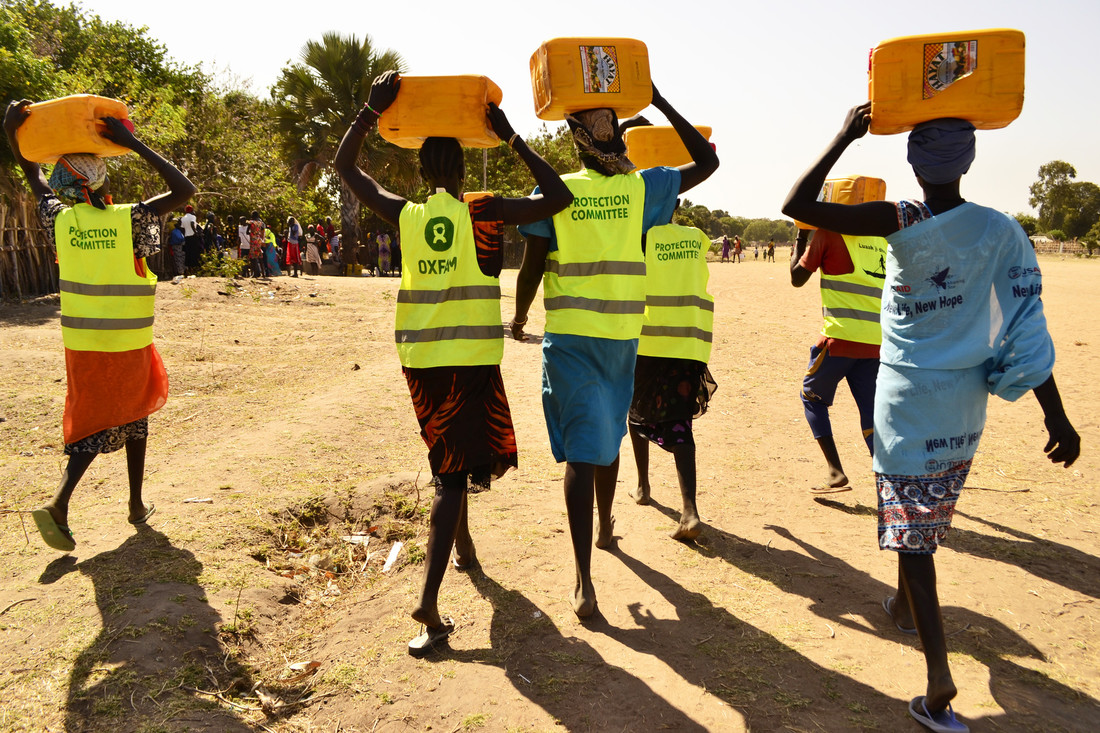After years of fighting, the US puts South Sudan’s leaders on notice
 Oxfam is assisting people in the vast Sudd swamp area who have fled conflict in Leer County. The agency is also urging those seeking negotiations to end the on-going violence to include all members of society: community leaders, activists, women, refugees, internally displaced people, and others should all play a role in ending the war. Photo: Rhea Catada/Oxfam
Oxfam is assisting people in the vast Sudd swamp area who have fled conflict in Leer County. The agency is also urging those seeking negotiations to end the on-going violence to include all members of society: community leaders, activists, women, refugees, internally displaced people, and others should all play a role in ending the war. Photo: Rhea Catada/Oxfam
The new US approach to South Sudan should invest in the country’s citizens to support an inclusive peace
On Thursday talks began in Addis Ababa for what the UN Security Council has called ‘the last chance’ for peace and stability in South Sudan. The choice of words may be somewhat hyperbolic, but they do capture the desperate urgency of the situation. The people of South Sudan have been left hanging for nearly four and a half years: as violence continues, humanitarian need has reached unprecedented levels. The stakes couldn’t be higher.
In recognition of the gravity of the moment and the lack of progress on previous efforts at peace, the White House issued a uncharacteristically blunt statement last week announcing a review of its assistance programs for South Sudan and criticizing South Sudanese leaders for ‘perpetuating an endless war’ and ‘pilfer[ing] the wealth of South Sudan.’
In many respects, it is not a surprise to see such exasperation from the US government. For years, it has struggled to make its influence felt in South Sudan, offering up funds for round after round of elite peace talks in posh hotels outside of South Sudan, while giving effective free rein to those who flout ceasefire after ceasefire.
The US statement, and the new policy it entails, is grounded in the recognition that sustaining this status quo is unacceptable. But it could be a mixed blessing. Given the Trump administrations’ inclination to back away from America’s role in the world and slash our lifesaving foreign aid budget, without proper oversight the assistance review could result in cuts that lead to an even worse humanitarian situation. On the other hand, if the tough words are translated into thoughtful and concrete measures, it could break the pattern of abuse and achieve real progress in three key areas: reinvigorating efforts to achieve a just and lasting peace, addressing the unprecedented humanitarian needs, and ensuring anyone who aspires to govern is held accountable to the country’s citizens.
For decades, the US has played an indispensable role in supporting the people of South Sudan. For too long, however, South Sudan’s citizens have suffered from the brutality of war with little chance to have their voices heard. Moving forward, whether the High Level Revitalization Forum talks ongoing this week succeed or fail, the US must throw its weight behind an inclusive peace process that gives South Sudanese community leaders, activists, women, refugees, internally displaced people, and others who represent the diversity of the country a broader and more effective role. South Sudan’s vibrant civil society has much to contribute despite the huge threats it faces.
To do so, the US government must actively seek the input of civil society, and South Sudanese as a whole, at every step of its review process. By creating space to hear directly from those most affected by the conflict, the review can ensure that donor support most effectively serves the urgent needs of those who depend upon it.
The people of South Sudan, and those who are working with them to save lives and build the country’s future, need peace and protection. Across the country, thousands of aid workers put themselves in harm’s way each day to ensure that aid reaches those who need it most. But with no end in sight to the fighting, it’s getting harder and more dangerous for aid organizations to reach communities who need support, and harder for these communities to reach the assistance they need to survive. Since the conflict began in 2013, 100 humanitarian workers have been killed, most of them South Sudanese who dedicated their lives to helping their neighbors meet their basic needs. Aid workers deserve the full support of the international community, including real consequences for any and all parties to the conflict who violate their obligations to respect and protect humanitarian relief personnel.
Every day Oxfam bears witness to the devastating human impact of South Sudan’s ongoing conflict. South Sudanese communities we work with tell us that they are increasingly losing hope. As the war drags on, the food security situation is even worse than when famine was declared last year. Humanitarian aid is keeping millions of people going, but as long as the fighting continues, these lifesaving efforts can only slow the country’s descent into deeper catastrophe, not prevent it. For that, violence must be stopped once and for all.
The US must not abandon the people of South Sudan in their hour of greatest need.
Given the unprecedented scale of the crisis, we expect to see the US assistance review result in honest, constructive conversations and solutions that make US support more effective. The review must not be used as an opportunity to walk away from America’s longstanding humanitarian and political commitments to the people of South Sudan but rather to increase their efficacy and impact.
The people of South Sudan are at a crossroads. Now is the time for the US to re-evaluate policies that enable those who use violence and invest instead in those who are genuinely committed to and working for peace.